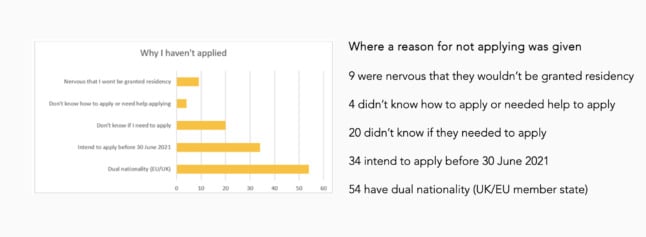Rights groups in France and the British Embassy have long been concerned about those Brits living off the radar in the country, who still might not be aware of the bureaucratic hoops they now need to jump through thanks to Brexit.
Even to this day The Local receives emails from people unsure whether they need to apply.
It also applies to people who already hold a European carte de séjour, are in the process of applying for a French nationality, or are married or PACSed to French or other EU nationals.
The only group who don’t have to apply are Brits who have already obtained dual nationality with an EU country, although they may apply if they wish. Children under 18 do not need to apply.
📢 ONLY 16 DAYS TO GO
👉 🇫🇷 From feedback, we now see 5 key groups that are at risk of falling through the gaps in France. If you know anyone who risks losing their rights, please check that they know they need to apply 🧵 pic.twitter.com/s0l49Vy8cr
— British in Europe (@BritishInEurope) June 14, 2021





 Please whitelist us to continue reading.
Please whitelist us to continue reading.
I have concerns for people who have made applications, received attestation and await contact from préfecture. I know 3 people who chased up and were told there was no dossier. They had to apply a second time. Two other people were told that they had not replied to an email. They had not received the email and are technology competent. So 5 errors out of 12 people that I know have applied.
According to some at the Anthony prefecture some Brits are arrogant thinking the can stay whatever happens.
I know exactly zero people out of dozens who applied in good time who haven’t got their cards yet.
Funny how these things work…..
You state that those in the process of applying for French nationality need to apply for the carte de séjour. What if you have a dossier/référence number for your application for nationality and the application is quite far along and you are just awaiting the call for the interview?
Hi, If you are not a French citizen by September 30th (and the application process for citizenship on average takes 18 months to 2 years) you will need a carte de séjour. A dossier or reference number for a citizenship application is not proof of your right to residency
I can help with paperwork / administration Française. Si vous ne comprenez pas le français de l’administration, demandez moi. Experte dans la paperasserie.
If you don’t speak/understand French ask me!
http://www.FrenchwithSimone.com